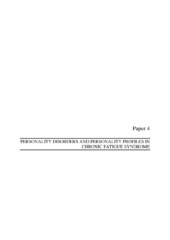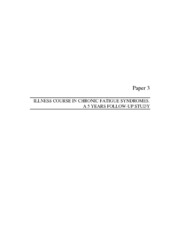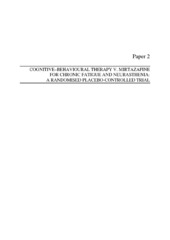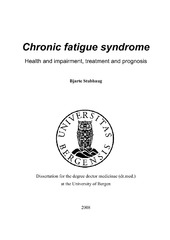| dc.contributor.author | Stubhaug, Bjarte | en_US |
| dc.date.accessioned | 2009-04-14T14:13:23Z | |
| dc.date.available | 2009-04-14T14:13:23Z | |
| dc.date.issued | 2008-06-06 | eng |
| dc.identifier.isbn | 978-82-308-0584-8 (print version) | en_US |
| dc.identifier.uri | https://hdl.handle.net/1956/3221 | |
| dc.description.abstract | Chronic fatigue syndrome (CFS) has been known as “neurasthenia” for more than hundred years and is today often called ME (myalgic encephalopathy), CFS/ME. The illness is characterized by excessive, prolonged and disabling fatigue, pain and somatic complaints, with functional and mental impairment and with major consequences in occupational and social life. Several case definitions with varying criteria are used for CFS. The prevalence is 0.5 % in a general population; the average length of the illness is more than 5 years, and rate of work disability is high. Prognosis is varying; few patients recover totally, but most patients improve substantially over 2-5 years. The objectives in this thesis were to investigate a clinical population with neurasthenia and chronic fatigue syndrome, by assessing subjective health complaints, functional impairment and work disability, by examining treatment effects of specific interventions, by studying long-term illness course and by analyzing the comorbidity of depression and personality patterns. 72 patients with ‘neurasthenia’ were compared with a reference population of 1000 patients in general practitioners’ waiting-rooms. Patients with neurasthenia had more prevalent and more severe subjective health complaints than the reference population of patients, longer periods of sick leave and higher rates of work disability. The patients with neurasthenia/ CFS went through a 6 months randomised clinical trial of mirtazapine, placebo and a comprehensive cognitive-behavioural intervention (CCBT) program of CBT, body awareness therapy and graded exercise. By 3 months the CCBT program had better effect on fatigue symptoms and clinical global severity than mirtazapine medication or placebo alone. By combining the interventions, the combination of CCBT followed by mirtazapine had significantly better effect on fatigue severity by 6 months than placebo or the opposite sequence of initial medication followed by CCBT. Generally, the whole group with neurasthenia and CFS showed substantial clinical improvement after the treatment interventions. In a 5 years follow-up study of this patient group, half of the patients reported a substantial reduction in fatigue symptoms, and diagnoses tended to shift from CFS towards neurasthenia and unspecific chronic fatigue during the follow-up period. Sudden onset, severity of fatigue at the initial phase of illness and slow improvement predicted a poor prognosis. Long-term course seemed more dependent of illness characteristics than of time-limited treatment interventions. The prevalence of personality disorders was found equal to non-clinical populations (13%) in CFS patients; the mean personality score was at an average level, indicating low general personality pathology. CFS patients had a clinical personality profile similar to that of somatoform disorder, with elevated scores of somatisation and health concerns and low scores of self-esteem and perfectionism. The findings in this thesis support the view of CFS as a severe illness with extensive health complaints and severe impairment. The findings also indicate that psychiatric symptoms and personality disorders are low in CFS. Although the prognosis of a full recovery in CFS seems poor, the effect of a comprehensive treatment intervention is generally good, and most patients improve gradually. | en_US |
| dc.language.iso | eng | eng |
| dc.publisher | The University of Bergen | eng |
| dc.relation.haspart | Psychoneuroendocrinology 30(10), Stubhaug, B.; Tveito, T. H.; Eriksen, H. R.; Ursin, H., Neurasthenia, subjective health complaints and sensitization, pp. 1003-1009. Copyright 2005 Elsevier Ltd. All rights reserved. Abstract only. Full-text not available due to publisher restrictions. The published version is available at: <a href="http://dx.doi.org/10.1016/j.psyneuen.2005.04.011" target="blank">http://dx.doi.org/10.1016/j.psyneuen.2005.04.011</a> | en_US |
| dc.relation.haspart | The British Journal of Psychiatry 192, Stubhaug, B.; Lie, S. A.; Ursin, H.; Eriksen, H. R., Cognitive–behavioural therapy v. mirtazapine for chronic fatigue and neurasthenia: randomised placebo-controlled trial, pp. 217-223. Copyright 2008 Royal College of Psychiatrists. All rights reserved. Abstract only. Full-text not available due to publisher restrictions. The published version is available at: <a href="http://dx.doi.org/10.1192/bjp.bp.106.031815" target="blank">http://dx.doi.org/10.1192/bjp.bp.106.031815</a> | en_US |
| dc.relation.haspart | Stubhaug, B.; Lie, S. A.; Ursin, H.; Eriksen, H. R., llness course in chronic fatigue syndromes. A 5 years follow-up study. Preprint version. Submitted. Copyright 2009 Stubhaug et al. | en_US |
| dc.relation.haspart | Stubhaug, B.; Hovland, O. J.; Lie, S. A.; Ursin, H.; Eriksen, H. R., Personality disorders and personality profiles in chronic fatigue syndrome. Preprint version. Submitted. Copyright 2009 Stubhaug et al. | en_US |
| dc.title | Chronic fatigue syndrome. Health and impairment, treatment and prognosis | en_US |
| dc.type | Doctoral thesis | |
| dc.subject.nsi | VDP::Medisinske Fag: 700::Klinisk medisinske fag: 750::Psykiatri, barnepsykiatri: 757 | nob |
| dc.subject.nsi | VDP::Medisinske Fag: 700::Klinisk medisinske fag: 750 | nob |




